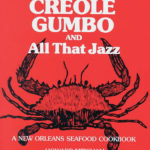One of Anthony Bourdain’s last works is an introduction to Howard Mitcham’s Provincetown Seafood Cookbook, originally published in 1975. In this tribute, Bourdain calls Mitcham’s cookbook “one of the most influential of my life.”
Dan Simon, founder and publisher of Seven Stories Press said he and his team approached Bourdain because they knew that he was “an admirer of Mitcham.”
Bourdain’s culinary career started in the early 1970s in Provincetown, where Mitcham was already a legend. “He was just so terrific,” Simon said. “I think he loved the gusto with which Howard lived his life and cooked and brought it all together.”
A writer, a scholar and an artist as well as the foremost chef of note from Mississippi, Howard Mitcham was a brilliant, stone-deaf, hard-drinking bohemian, raconteur and bon vivant who knew and corresponded with the great and near-great.
A name chef during what Bourdain himself called “the early happy days before the glamorization of chefs”, a historian and an artist as well, we should remember Mitcham with gusto. His Provincetown Seafood Cookbook stands loud, proud and without a smidgeon of pretension alongside any cookbook written in the past century, a robust ragout of food, people, art and lore.
Mitcham nurtured, cultivated and matured his sprawling genius in the rich enclaves of Provincetown and New Orleans. For decades he was a spectacular bird of passage, summering on Cape Cod, wintering in the French Quarter and coming home to Montgomery County, Mississippi at times.
His books trumpet a passion for seafood; his writings on oysters and clams, shrimp and fish seem to pant with restraint. Mitcham wants you to partake of everything he knows and loves with the same gusto he does in hearty sentences that growl with gruff humor and wry authority.
“People think I’m sort of coo-coo to publish my trade secrets and recipes,” he wrote, “but to me good food is like love, it should be given as wide a distribution as possible.”
James Howard Mitcham, Jr. was born in Winona, Mississippi on June 11, 1917. His father, a house painter, died when he was a year old. His mother moved to Vicksburg to find work, leaving the infant Howard with her parents on their watermelon farm on Sawmill Road. At sixteen Mitcham became deaf from nerve damage resulting from spinal meningitis.
For the rest of his life, Mitcham spoke with a thick, booming Southern accent, but used sign language and notes to abet his frequent incoherency. He grew up loving jazz, a love silence didn’t kill. “The last song he ever heard was Billie Holiday’s ‘Am I Blue?’”, his daughter Sabina said. “Whenever he’d sing it, it would just break my heart. At his birthdays he would place his hand on the bell of a sax to get the beat.”
Mitcham attended Greenville High School with lifelong friend Shelby Foote as well as Walker Percy. After graduating high school, Mitcham moved to Vicksburg to live with his mother and began attending Louisiana State University as an art student, and at some point, in the late 1940s, Mitcham moved to Greenwich Village in New York City, where he ran an art gallery.
What quirk of fate or fortune that first took Mitcham from his home in the Deep South to the distant shores of Cape Cod is a matter rich for speculation, but he claims to have made his first visit there as early as 1948. Thereafter for most of his life, Mitcham divided his years between New Orleans and Provincetown.
His abounding love for Provincetown bore prodigious fruit in 1975 with the publication of The Provincetown Seafood Cookbook, an unsurpassed ode to a food, a place and a people. Bourdain, who worked in Provincetown during the mid-1970s when he was attending (of all places) Vassar, knew Mitcham and in his Kitchen Confidential writes that “Howard was the sole ‘name chef’ in town.”
“To us, Howard was a juju man, an oracle who spoke in tongues,” Bourdain wrote. “He could be seen most nights after work, holding up the fishermen’s bars or lurching about town, shouting incomprehensibly (he liked to sing as well). Though drunk most of the time and difficult to understand, Howard was a revered elder statesman of Cape cod cookery, a respected chef of a very  busy restaurant and the author of two very highly regarded cookbooks: The Provincetown Seafood Cookbook and Creole Gumbo and All That Jazz—two volumes I still refer to, and which were hugely influential for me and my budding culinary peers of the time.”
busy restaurant and the author of two very highly regarded cookbooks: The Provincetown Seafood Cookbook and Creole Gumbo and All That Jazz—two volumes I still refer to, and which were hugely influential for me and my budding culinary peers of the time.”
“He had wild, unruly white hair, a gin-blossomed face, a boozer’s gut and he wore the short-sleeved-snap-button shirt of a dishwasher. Totally without pretension, both he and his books were fascinating depositories of recipes, recollections, history, folklore and illustrations, drawing on his abiding love for the humble, working-class ethnic food of the area. His signature dish was haddock amandine, and people would drive for hours from Boston to sample it.”
“We might not have understood Howard, but we understood his books, and while it was hard to reconcile his public behavior with the wry, musical and lovingly informative tone of his writings, we knew enough to respect the man for what he knew and for what he could do. We saw someone who loved food, not just the life of the cook.
Howard showed us how to cook for ourselves, for the pure pleasure of eating, not just for the tourist hordes. Howard showed us that there was hope for us as cooks. That food could be a calling. That the stuff itself was something we could actually be proud of, a reason to live.”

